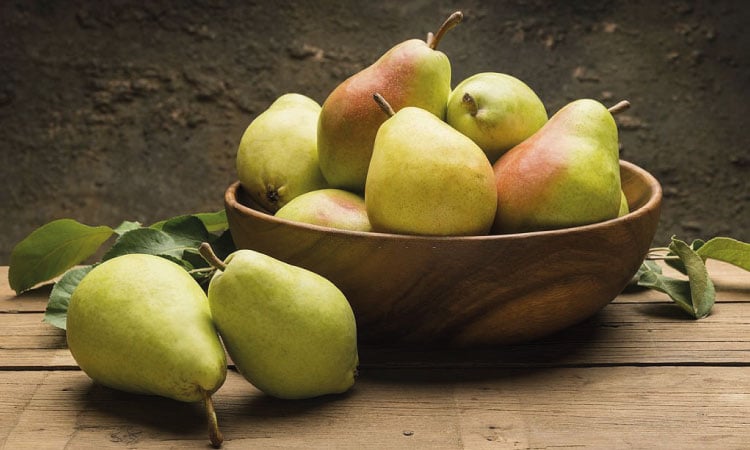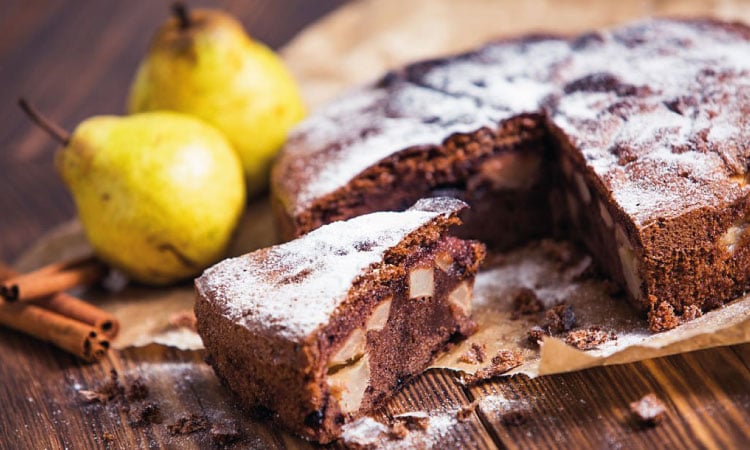During pregnancy, expecting mothers should be careful about their diet. A pregnant woman’s food is her baby’s main source of nutrition. In other words, a varied and healthy diet throughout pregnancy is essential for the baby’s development and growth. For their health and the health of their unborn child, pregnant women should closely monitor the food they consume. Many nutritious foods are not suitable during pregnancy. Read up on the safety of eating pear during pregnancy.
Are Pears Safe During Pregnancy?
Pears have a high nutritional value and are low in calories1. Pears are perfectly safe to consume moderately during pregnancy. They contain minerals such as potassium and calcium, as well as other nutrients that are highly beneficial during pregnancy. Folate is one of the vital nutrients in Asian pears.
Thus, eating Asian pear during pregnancy helps to reduce the risk of neural tube defects in the fetus. It also contains a range of minerals and elements, such as sulfur, pectin, phosphorus, potassium, cobalt, calcium, iodine, iron, zinc, copper, fiber, and tannins. Before eating any fruit with the skin, it is advisable to thoroughly wash it. Pears are no exception.

Health Benefits Of Eating Pear Fruit During Pregnancy
Women who are pregnant are often advised to eat a lot of fruit. Summer is a good time to purchase sweet, tart-tasting pears. There are several nutrients in this fruit that are vital to a healthy pregnancy. Learn the benefits of eating pear during pregnancy and how eating pears can boost your pregnancy’s health.
1. Promotes cardiovascular health
Pears are one of these fruits and contain a lot of potassium2. Potassium plays a role in the balance of electrolytes in the body. It is well-known that potassium regulates blood pressure because it serves as a vasodilator. Also, pears contain powerful antioxidants, such as procyanidins and quercetin, which can aid in heart health3.
Eating pears during pregnancy may help to increase blood flow to all parts of the body (such as the uterus and fetus), oxygenating them and promoting their efficient performance. Potassium in pear can also decrease cramps %in the legs and abdomen, two common issues during pregnancy.
2. Helps with digestion

22% of your daily fiber requirements can be met by one medium-sized pear4. Fibers in pears are incredibly beneficial for digestion as well. The fiber in pears is largely composed of non-soluble polysaccharides (NSPs), which help add bulk so that the food can pass easily through the intestines. Thus, eating a pear a day regulates bowel movements and is an easy home remedy to reduce constipation, which is one of the most common issues during pregnancy.
3. Relieves inflammation
The flavonoids and antioxidant components in pears make them an excellent food to beat inflammation. Pears are well known for their antioxidant and anti-inflammatory properties5. These properties of pears may help reduce swelling and joint pain. Joint pain and swelling are common during pregnancy. Including pears in your pregnancy diet may provide some relief.
Calculate Due Date With LMP
Related Reading: 15 Home Remedies For Swollen Feet During Pregnancy
4. Pears during pregnancy can boost immunity
Vitamin C, which is concentrated in the fruit’s skin, is a prominent vitamin present in this fruit. Pears contain approximately 7 mg of vitamin C, making them a good source of this vitamin6. Vitamin C works as a great antioxidant. Antioxidants stimulate white blood cell production, which is essential for strengthening the immune system.
Thus eating pears during pregnancy helps ward off common infections like flu, cold upset stomach, and more. Furthermore, antioxidants prevent any damage caused by free radicals due to their ability to neutralize them. Additionally, soluble fibers in pears are necessary for maintaining healthy gut bacteria. Having healthy gut bacteria boosts immunity during pregnancy.
5. Enhances bone health
Pears contain copper, calcium, phosphorus, manganese, and magnesium in significant quantities, all of which contribute to bone health. Although these minerals are required in very small amounts, they play a crucial role in maintaining healthy bones. The importance of bone health during pregnancy cannot be overstated. If pregnant women neglect their bone health and fail to take sufficient minerals to enhance bone density, they may later develop osteoporosis.
Those who suffer from debilitating conditions like osteoporosis are advised to eat pears regularly as they can help prevent and treat bone loss7.
6. Lowers the risk of anemia
The risks of anemia for pregnant women are high. Pears of medium size provide fifteen percent of a person’s daily copper requirement8. Having high copper levels and a decent amount of iron, pears are beneficial to pregnant women who suffer from nutritional deficiencies, such as anemia. The iron content in the fruit aids in the production of red blood cells, while the copper content in the fruit enhances the absorption of essential minerals including iron into the body.
7. Pears during pregnancy aid fetal development
They are rich in vitamin C. This powerful antioxidant is crucial to a baby’s development. Vitamin C also strengthens the teeth and gums of babies. Additionally, pear contains vitamins A, D, K, E, B-12, and B-6. Pears also contain folates9. Vitamin A reduces the chances of contracting infectious diseases. This contributes to the healthy progression of pregnancy and fetal development.
Vitamin A is also known to promote fetal eye development. These vitamins are also necessary for the proper growth and development of fetal bone and kidneys. Moreover, all these nutrients in pear can aid in the development of the circulatory, respiratory, and nervous systems of an unborn baby.
Related Reading: 12 Signs Of Healthy Baby In Womb- Trimester Wise
8. Prompts healthy weight gain
During pregnancy, a healthy weight gain is very important, yet many pregnant women gain more weight than they need to. Being overweight during pregnancy causes many complications. Incorporating pears into the pregnancy diet may help you healthily gain weight.
The high water content of pears makes them high in volume but low in calories. This means you can indulge guilt-free when hunger strikes. Pears are high in fiber content, which helps you feel full for longer. As a result, your hunger pangs are minimized and you don’t munch at odd hours.
9. Good for gestational diabetes
A medium-sized pear contains 6 grams of fiber, 21% of the recommended daily value, and vitamin C. Fibre in pear helps slow digestion and keep blood sugar levels stable for longer. Additionally, pear contains anthocyanins, which are known to regulate blood sugar levels. Additionally, the pear has a low glycemic index, so pregnant women with gestational diabetes can have it as it won’t raise their blood sugar rapidly. This fruit is excellent for satisfying the sweet tooth of expecting women without causing a spike in blood sugar10.
Related Reading: Everything About Artificial Sweeteners During Pregnancy
10. Relieves morning sickness
Pears contain Vitamin B6. Although not a rich source of vitamin B6 (contains 0.02 mg per 100 grams of fresh pear), eating pear during pregnancy in the first trimester may help to alleviate nausea and vomiting during pregnancy. Many women find drinking apple-pear juice very effective in relieving morning sickness during pregnancy.
How Many Pears Can You Eat During Pregnancy?

You may experience digestive problems if you consume too many pears because of their high fructose content. Therefore, pears should be consumed moderately during pregnancy. During pregnancy, pregnant women can eat up to two medium-sized pears a day. In case you feel that it is too much, you can decrease the number, but you shouldn’t eat more than two each day.
How To Select And Store Pears?
To reap the health benefits of the fruit, the quality of the fruit is very important. Both selection and storage affect fruit quality. Pears are no exception. However, how should pears be selected during pregnancy? Here is some information on how to choose fresh and good pears and how to store them.
How to select good pears
- Pears with dark or mushy spots and tears in the flesh should be avoided
- Firm pears with intact stems are best
- The texture of the pear should be fairly firm and consistent
- Fruit is less ripe when it is harder
- When you press your thumb on the pear’s neck, it will flex to pressure, which indicates that it has reached its ripeness
Storing pears
- The pears should be used as soon as possible if they are ripe when you buy them
- Pears that are firm and still need time to ripen can be left out at room temperature
- Pears are susceptible to absorbing other foods with strong scents. Therefore, it should be stored separately in a brown paper bag if you want to store it in the refrigerator
- Fruit must be consumed within a week to reap its health benefits
- Store the fruit in its uncut condition
Related Reading: 15 Fruits Not To Eat During Pregnancy
Things To Consider When Consuming Pears During Pregnancy
During pregnancy, eating pears in moderation does not have any side effects. However, If you want to include them in your pregnancy diet, you must take into account a few things.
- You should eat pears shortly after your meal. If eaten on an empty stomach, the acid content in pears may react and irritate your stomach
- Pears should always be eaten as soon as they are cut. Otherwise, they oxidize and turn brown
- It is difficult to digest pear because of its fiber content. The fruit should not be eaten if you suffer from digestive problems
- Pears should not be eaten in excess if you have gestational diabetes
- Excessive intake of pears during pregnancy may cause bloating, vomiting, and diarrhea
- It is not recommended to eat unripe pears as they may cause stomach problems
- Before eating fruits, you should thoroughly wash them. The surfaces of fruits are infested with bacteria, parasites, and pathogens
Pear Fruit In Your Pregnancy Diet

Pears are an excellent addition to smoothies, salads, and oatmeal. Freshly cut pears also make a delicious snack. Here are some ideas on how to include them in your pregnancy diet:
- Pears can be baked with cinnamon, honey, walnuts, and brown sugar. Baked pears can relieve morning sickness
- Another excellent way to consume pears is by juicing them. You can even try different combinations, such as pear-carrot juice, pear-apple juice, pear-ginger juice, etc
- Sliced pears are a great addition to a fruit or mixed salad
FAQs
The skin of a pear is primarily a source of phytonutrients. Peeling the skin results in a loss of 25% of the plant’s beneficial chemicals.
To avoid food-borne diseases like listeriosis and toxoplasmosis, you should wash pears thoroughly before eating. Unwashed pears may contain harmful bacteria and parasites.
Pear’s high fiber content causes gas and bloating in some people. To prevent gas formation, it is recommended to eat pears as a mid-morning snack and not with other food.
